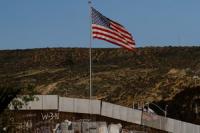-
DHS has found only $20 million of the $21 billion needed for border wall

President Donald Trump’s pledge to use existing funds to launch the construction of a wall on the U.S.-Mexico border has run into an obstacle: There is only little money available to start the project. DHS has identified only $20 million that can be reallocated to the $21 billion project. DHS searched for available funds only within its $376 million budget for border security fencing, infrastructure and technology. Redirecting funds from other departmental accounts would require congressional approval. The funds currently available would cover 0.1 percent of the project’s cost — or pay to build 2.5 miles of border barrier.
-
-
Israeli security-fence company lobbies to build Trump’s wall
Shares of Israeli security company Magal Security Systems Ltd. jumped 5.6 percent on 27 January, the day after Donald Trump told Fox News a security barrier along the U.S.-Mexico border could stop most border breaches. The company’s shares have risen nearly 50 percent since Trump’s election. Trump said a wall would be effective in preventing illegal immigration from Mexico. “All you have to do is ask Israel,” he told Fox News. “They were having a total disaster coming across, and they had a wall. It’s 99.9 percent stoppage.”
-
-
Survey of Texans in Congress finds little support for full border wall

None of the thirty-eight Texans in Congress offered a full-throated endorsement of a complete border wall, a position popular with President-elect Donald Trump’s supporters. Instead, several members of the Texas delegation called for new policies on the border, including fencing and walls in some places, and beefing up security in other ways such as employing new surveillance technology and adding more federal agents.
-
-
There is a crisis of death, disappearance at the U.S.-Mexico border: Critics
No More Deaths, an immigration advocacy group, says that there is a crisis of death and disappearance happening at the U.S.–Mexico border. On Tuesday, the Tucson, Arizona-based group released Part 1 of a three-part report series aiming to bring this crisis to light. “Mass death and disappearance are the inevitable outcomes of a border enforcement plan that uses the wilderness as a weapon,” the report says.
-
-
With Trump in D.C., Texas might spend less on border
With a tight Texas budget session ahead in 2017, state legislators are already looking for every available dollar. Not having to spend $800 million on border security — the amount allocated in the previous two-year budget — would amount to a huge financial windfall at the state Capitol. Not counting federal funds, the Legislature spent about $114 billion in the last budget. If President-Elect Donald Trump delivers on his promise to dramatically beef up security on the U.S.-Mexico border, leading Texas lawmakers say they might quit spending so much state tax money on it.
-
-
Value of Israeli border fencing company’s shares soar in wake of Trump victory
Magal Security Systems, the Israeli company which built the defensive fence system around the Gaza Strip saw a surge in shares after Donald Trump was confirmed as the winner of Tuesday’s election. Magal had looked with anticipation at the prospect of a Trump victory how it would help the barrier-building business. Magall has built border walls and fences in Egypt, Somalia, and other African countries.
-
-
Lessons learned in U.S.-Canada cross-border experiment
DHS S&T First Responders Group (FRG) and Canadian partners held the CAUSE IV experiment on the Michigan-Ontario border. The two territories are connected by the Blue Water Bridge spanning the St. Clair River, which is the second-busiest transit point between the United States and Canada. The goal of the CAUSE experiment series is to stage emergency scenarios to prepare first responders and communities on both sides of the U.S./Canada border for a potential natural or manmade disaster.
-
-
Security facts about the border wall
During this 2016 election year, there are basic security facts about the wall between Mexico and the United States that every American should clearly understand before he or she considers the merits of the policy solutions offered by our political parties. Security facts about the border wall are not always intuitive, based upon what passes for common sense, or even easily available to the general public. In contrast, abundant myths and falsehoods, regardless of how often they are repeated, are rarely based upon documented evidence produced by serious researchers. Instead, these assertions may be of part of election motives and agendas throughout the ballot from top to bottom. Americans should continue to learn more about our entire border security system in this region. These facts about our border security matter, and will continue to matter, long after this election day.
-
-
CBP MVSS border surveillance system: Another border program mired in delays
Political parties debate crucial immigration issues, including a call for a new border wall, but an essential component — frequently neglected in the run up to the November elections — is the efficacy of the Customs and Border Protection (CBP) contract acquisition and management process. What is frequently overlooked is the “business side” of CBP – but the business side of CBP is crucial to any immigration policy. CBP agents and officers finally are benefiting from the much-delayed delivery of the Integrated Fixed Tower (IFT) surveillance technology program, but the status of the Remote Video Surveillance Systems (RVSS) and Ultra-Light Aircraft Detection (ULAD) surveillance technology programs has not been ascertained. After many needless Office of Technology Innovation and Acquisition (OTIA) delays and problematic contract management decisions, both the MVSS program, along with the Mobile Surveillance Capabilities (MSC) program, now appear to be dead in the water.
-
-
Mexico Senate considering bill which would take back land from U.S. if Trump is elected

Mexico’s Senate is considering a bill to revoke Mexico’s bilateral treaties with the United States, including the 1848 agreement which transferred half the country’s territory to the United States. The 1848 Treaty of Guadalupe Hidalgo was signed to bring a two-year war between the two countries – a war which Mexico lost — to an end. As part of the treaty, Mexico gave the United States a vast swath of territory, which is now New Mexico, California, Arizona, Utah, Nevada, and parts of Wyoming and Colorado. The proposal contains a clause which stipulates that the bill will go into effect only if Donald Trump is elected president – and if he insists on Mexico paying for the border wall he pledged to build along the U.S.-Mexico border, and goes ahead with unilateral changes to NAFTA.
-
-
Scanners more rapidly and accurately identify radioactive materials at U.S. borders, events

Among the responses to the 9/11 terrorist attacks, DHS, among other things, has increased screening of cargo coming into the country. At MIT, the terrorist attacks gave rise to a company dedicated to helping DHS — and, ultimately, other governments and organizations worldwide — better detect nuclear and other threats at borders and seaports. Today, Passport — co-founded in 2002 by MIT physics professor emeritus William Bertozzi — has two commercial scanners: the cargo scanner, a facility used at borders and seaports; and a wireless radiation-monitoring system used at, for example, public events.
-
-
Many migrants arriving in Europe this year are unaccompanied children

More than 9 out of 10 refugee and migrant children arriving in Europe this year through Italy are unaccompanied, prompting UNICEF to warn of the growing threats of abuse, exploitation, and death facing them. In a report, Danger Every Step of the Way, released the other day, UNICEF says that 7,009 unaccompanied children made the crossing from North Africa to Italy in the first five months of the year, twice as many as last year.
-
-
Lawsuit seeks information on CBP's complaint process
The American Immigration Council the other day filed a lawsuit under the Freedom of Information Act (FOIA) to compel the release of additional documents related to the complaints process at U.S. Customs and Border Protection (CBP). The Immigration Council says it is seeking to update information received from CBP in its previously filed FOIA request, in which it obtained data concerning 809 complaints of abuse lodged against U.S. Border Patrol (USBP) agents between January 2009 and January 2012.
-
-
CBP MSC vehicle contracts to Telephonic appear problematic
According to federal government documents, problematic contract inconsistencies predominate in yet another CBP surveillance technology program. The CBP contract in question calls for the production of Multiple Surveillance Capability (MSC) vehicles. Unfortunately, the unintended consequences of these documented problematic delays in the CBP and Office of Technology Innovation and Assessment (OTIA) acquisition process with Telephonics MSC vehicle contracts have serious ramifications. Equally troubling is that CBP MSC contract delays from 2010 to 2015 mirror SBInet delays from 2006 to 2011. These contract delays with Telephonics MSC vehicles, a surveillance technology already in place in other countries, continues to create a U.S.-Mexican border far less secure or safe than it should or has to be.
-
-
Tighter U.S.-Mexico border enforcement has backfired: Study
From 1986 to 2010, the United States spent $35 billion on border enforcement, but the net rate of undocumented population growth doubled. The rapid escalation of border enforcement over the past three decades has backfired as a strategy to control undocumented immigration between Mexico and the United States, according to new research that suggests further militarization of the border is a waste of money.
-
- All
- Regional
- Water
- Biometrics
- Borders/Immig
- Business
- Cybersecurity
- Detection
- Disasters
- Government
- Infrastructure
- International
- Public health
- Public Safety
- Communication interoperabillity
- Emergency services
- Emergency medical services
- Fire
- First response
- IEDs
- Law Enforcement
- Law Enforcement Technology
- Military technology
- Nonlethal weapons
- Nuclear weapons
- Personal protection equipment
- Police
- Notification /alert systems
- Situational awareness
- Weapons systems
- Sci-Tech
- Sector Reports
- Surveillance
- Transportation
Advertising & Marketing: advertise@newswirepubs.com
Editorial: editor@newswirepubs.com
General: info@newswirepubs.com
2010-2011 © News Wire Publications, LLC News Wire Publications, LLC
220 Old Country Road | Suite 200 | Mineola | New York | 11501
Permissions and Policies
Editorial: editor@newswirepubs.com
General: info@newswirepubs.com
2010-2011 © News Wire Publications, LLC News Wire Publications, LLC
220 Old Country Road | Suite 200 | Mineola | New York | 11501
Permissions and Policies
